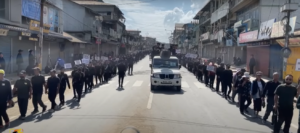Unau is your digital destination for celebrating the essence of brotherhood across the Kuki, Mizo, Zomi, and Hmar tribes.
6th October 2023: The ongoing ethnic strife in Manipur has cast a long shadow over the aspirations of Central and All-India government job aspirants, particularly from the Zo inhabited hill districts. The turmoil has made Imphal, the state’s capital, inaccessible for these aspirants, pushing them to undertake arduous journeys to other states to appear for their examinations. This scenario not only imposes a financial burden but also the strain of long and difficult road travels via Mizoram.
The unemployment rate in the hill districts, predominantly inhabited by the Zo tribes, was estimated at 9.5% as per the Periodic Labour Force Survey for 2021-22, higher than the 7.6% unemployment rate in urban areas where a significant portion of the Meitei population resides. The report also highlighted that nearly 65% of men in rural areas are self-employed compared to the all-India rate of 59%. With the internet ban prolonging in Manipur, filling up examination forms on time has become a challenge, further narrowing down the job prospects and economic opportunities for the educated Zo tribal youth.
The computer-based examination centers in Lamka, which previously hosted exams conducted by the Staff Selection Commission (SSC) and National Testing Agency (NTA), remain non-functional since the onset of ethnic violence. While online examinations resumed in Imphal since March, the tribal-inhabited districts have yet to see any examination conducted. The situation has left the Central and all-India services as one of the most prospective career options for the educated Zo tribal youth, given the declining job opportunities due to the structural discriminatory policies of the Manipur government.
Various Zo student bodies, including the Zomi Students’ Federation (ZSF) and the Joint Student Body Lamka (JSB), have petitioned the Governor and the Chief Secretary, seeking urgent measures to initiate or resume examinations under SSC, NTA, Institute of Banking Personnel Selection, and Common University Entrance Test in the tribal-inhabited districts. The letters underscored the financial burden borne by aspirants and their families preparing for these exams.
In response to these representations, it has been learned that the Central government is evaluating the feasibility of conducting banking and insurance-related examinations in the hill districts, a move that could alleviate some of the hardships faced by the Zo students. This issue not only highlights the immediate impact of the ongoing ethnic conflict but also the long-term repercussions on the educational and employment prospects of the tribal youth in Manipur.
The plight of Zo students is a stark reminder of the broader socio-economic ramifications the ethnic violence has on the future of Manipur’s youth, urging for swift resolution and restoration of normalcy to ensure equal educational and employment opportunities for all.








